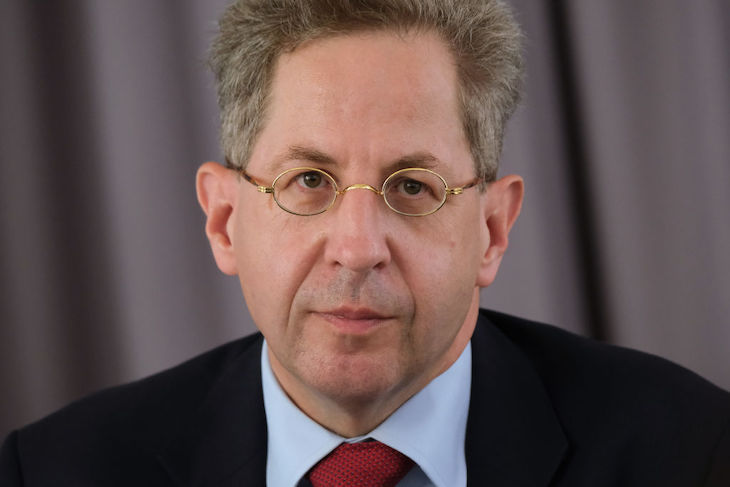It’s not often that an ex-spymaster is spied upon by his former colleagues. But just that has happened in Germany, where Hans-Georg Maassen, the former head of the country’s internal security service, the BfD (equivalent to Britain’s MI5), has been placed on a watch list for official observation as a suspected right-wing extremist.
Maassen, who ran the BfD until he was elbowed out in 2018 after appearing to play down the threat of violence from right-wing extremists, is no stranger to attracting attention. In 2021, Maassen said that chancellor Angela Merkel’s immigration policies were ‘fatal’:
The spy agency has also accused its former chief of being in close touch with the AfD
‘(Germans) simply cannot understand why ever more people are coming into this country even though they obviously have no right to asylum; why we aren’t deporting them and why politicians just put up with the fact that the people here are falling victim to these migrants.’
This week, Maassen tore up his CDU membership and founded his own political party, the Values Union. The new outfit will join an increasingly fractured political landscape in Germany. For years after 1945, the country was run by just three parties – the centre right CDU/CSU, the centre left SPD, and the Liberal FDP – who often ruled in coalition with each other. Recently, however, this troika has been challenged by upstart newcomers on the right and on the left, the Greens and die Linke (‘the Left’) which arose from the ashes of Communist East Germany’s ruling party, the SED. Most disturbing to the old order, however, has been the rise of the right-wing Alternative for Germany party. Founded in 2013 to oppose the introduction of the euro, the AfD swiftly morphed into a hard right populist party whose main plank is opposition to mass immigration.
The AfD now commands around 20 per cent in polls, and looks like topping the European parliament elections in three east German states in June. With his new party, Maassen is hoping to tap into this rise in right-wing opposition to the ruling red-orange-green ‘traffic light’ coalition of the SPD, FDP and Greens in Berlin. He seeks to appeal to conservatives in the CDU who resented Merkel’s open doors migration policy, but find the AfD too vulgar and extreme for their taste.
But the spy chief has clearly gone too far in his rhetoric for the guardians of Germany’s constitutional order who have told his old colleagues in the BfD to open a file on their former boss. This monitoring appears to be in response to speeches and articles by Maassen in which he has accused the government of leading Germany towards collapse and decline with its liberal immigration and asylum policy.
The spy agency has also accused its former chief of being in close touch with the AfD, and being sympathetic to the ultra-right Reichsburger group, several of whose members are facing trial for allegedly plotting a putsch to overthrow the German state and install a dictatorship. Maassen responded to the accusations by saying that he was being ‘persecuted’ with no substantive evidence. On Twitter, he said the monitoring undertaken by the state shows that ‘Germany is clearly afraid of me.’
Germany is, of course, especially sensitive to any suggestion of political extremism because of its Nazi and Communist past. Such sensitivity about authoritarianism can itself risk becoming authoritarian, however: when I was a student in Germany at the height of the far left terrorism of the Red Army Faction, or Baader-Meinhof group, even moderate socialists were threatened with a ‘berufsverbot’: an undemocratic ban on taking state jobs like teaching just because of their political opinions.
Maassen is not the first spy chief to have fallen foul of the German state. In 1954, at the height of the Cold War, Otto John, the first postwar chief of the BfD, vanished from West Berlin and appeared in the Communist-ruled east of the city to denounce Nazism in West Germany. He was then taken to Moscow and interrogated by the KGB. In 1955, John reappeared in West Germany claiming to have been drugged and abducted by the Communists. He was disbelieved and was tried and imprisoned for treason. As John was one of the few survivors of the wartime resistance against Hitler, his imprisonment was embarrassing, and he was soon freed. He spent the rest of his life fighting without success to overturn his conviction. He died in 1997.
This article is free to read
To unlock more articles, subscribe to get 3 months of unlimited access for just $5







Comments
Join the debate for just $5 for 3 months
Be part of the conversation with other Spectator readers by getting your first three months for $5.
UNLOCK ACCESS Just $5 for 3 monthsAlready a subscriber? Log in